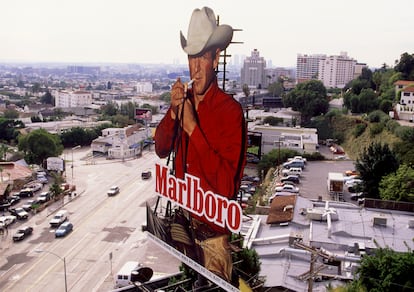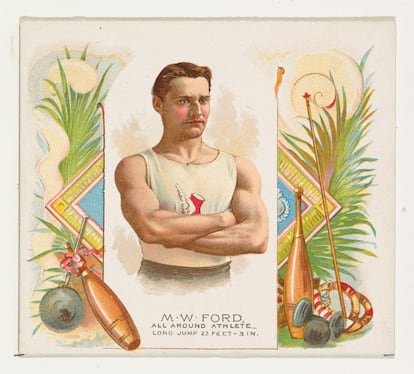‘Nicotine wakes you up’: How Zyn pouches became the US extreme right’s latest obsession with regaining ‘lost’ manhood
A new search for virility spreading through the most conservative sectors of America has found its symbol in nicotine pouches, a nod to the Marlboro Man who represented values they consider long gone


Although the consumption of nicotine pouches is still very limited in Europe, their addictive power worries the European Commission, which recognizes that in view of the existing legal vacuum and the absence of tobacco in these products there is no specific directive regulating their use. However, Stacey Kennedy, the president of U.S. tobacco giant Philip Morris, says that sales numbers have grown with respect to the expectations for this campaign thanks to the sale of tobacco pouches. Demand for Zyn pouches, the best-known brand, increased by 66% in the United States in the third quarter of last year.
The American political sphere has politicized the use of nicotine pouches and linked it to an idea of manhood it considers endangered. It is not the first technique that has attempted to bring back macho ideals in a world — according to certain sectors of the ultra-right — consumed by feminism and so-called woke culture: before Zyn there were testicle tanners and testosterone parties. Tucker Carlson, the controversial former Fox News host, has been championed as the first Zynfluencer. “He semifamously used to smoke, moved to nicotine gum, moved to Zyn a couple years ago and swears by it. He calls it a mind-enhancing drug. And he also came up with this heuristic, which I heard from a lot of conservatives, that right now, the state, from Democrats to business-friendly Republicans, they want to legalize THC. They want to legalize marijuana, but they want to keep banning nicotine. Why is that? His construction was THC makes you lazy and compliant. Nicotine wakes you up and makes you achieve things,” journalist David Weigel told NPR in an interview discussing how nicotine pouches have become the latest political battleground.
But Carlson is not alone in extolling the supposed benefits of Zyn: people who use these pouches, which, when placed under the lip, cause nicotine to be absorbed at high speed to raise blood pressure and heart rate, claim that it frees the mind and increases both productivity and sexual potency. Thus, nicotine pouches have become part of a masculinized and ultra-virile vision of health that, as pointed out in an article in Vox, makes the cult of the body and these nicotine pouches its weapons to become more sexual and productive.

In search of lost masculinity?
Nicotine pouches, which are inspired by a tobacco-derived product called Snus, contain a highly addictive stimulant and have become popular in industries linked to finance and technology. From icons of the tech spectrum, such as Elon Musk, to the controversial and misogynistic influencer Andrew Tate, the message they are all sending is that hand in hand with stimulants and the cult of the body it is possible to regain the absolute dominance that, according to their beliefs, society and feminism are stealing from them. “Many macho men are afraid of losing their power and privileges, from cyber-misogynists to coaches of neoliberal success. They try to cling to historical patriarchy and an expired power that’s taking its last breaths, something that undoubtedly speaks of their complexes and fears,” explains sociologist and sexologist Erick Pescador Albiach. “That discourse that some men spread on social media that sells the idea of achieving the best version of yourself reminds me of the amount of frustrated, depressed, or men on the verge of suicide, that this system has created and destroyed. It is the worst of the macho discourse, which also fights against feminism.”
“They hate nicotine. They love THC. They are promoting weed to your children but they’re not letting you use tobacco or even non-tobacco nicotine delivery devices which don’t cause cancer. Why do they hate nicotine? Because nicotine frees your mind, and THC makes you compliant and passive,” Carlson said on Fox News in January 2023. He has also confessed that he has a Zyn pouch under his lip until seconds before he goes to sleep and is unable to understand why the left is against nicotine. “It may be bad for some, but it’s not bad for everyone, and it actually has a lot of medical benefits that have been documented. It increases your mental capacity, your testosterone levels, and it can fight Alzheimer’s and Parkinson’s, so I don’t understand what their problem is,” he said.
“They fear a society when a man wakes up in the morning, drinks black coffee, pops a cool mint upper decky [a Zyn pouch], and takes on the world,” said Greg Price, communications director for the ultra-conservative State Freedom Caucus Network, on social media. “A man with nicotine, protein, caffeine, and creatine coursing through his veins is an unstoppable force. Imagine if Joe Biden had a couple smooth sixes [pouches] that he took every day. Maybe he’d know where to walk when he finished his speeches,” he added.
MSNBC thinks you’re a nazi if you work out lmaooo
— Elon Musk (@elonmusk) July 10, 2023
The paradox of masculinity
Apparently, these John Waynes of 2024 have made workouts and nicotine pouches the new symbols of their manhood and have decided that physical exercise is the best way to reclaim their masculinity. “The cult of the body has always been a classic value of masculinity that commodifies men, either by militarizing them or putting them to work with their bodies,” Manuel Gare, author of Macho, an essay-memoir on masculinity that transits the world of sports, work culture, success, failure, and the silences of men, explains to EL PAÍS. “If we add to work and war the physical power of sport, we have the three pillars on which men have historically been given meaning in our societies. But now men no longer occupy all the positions of power and their relationship with the other sex has changed. For some it is a liberation, but for others what remains is a feeling of emptiness and of failing. Faced with this lack of answers, many return to the body.”
When asked about the curious link between stimulants, adrenaline and masculinity, Gare admits that he thinks it’s an amusing contradiction. “It involves assuming that you’re not a complete man and that you need supplements and external agents to prove that, indeed, you are. It’s the eternal paradox of masculinity: exaggerating our manhood to the extreme and constantly proving to others that we are men, while living in fear of not being man enough,” he says.
Pescador Albiach stresses that the traditional, toxic model of masculinity is based on power, strength, and “putting up with everything. Those natural and artificial stimulants grant the illusion of being able to power through everything, but it’s a fantasy. We know that it is not the man who can withstand the most who is more powerful, but the one who knows his emotions and weaknesses the better. These cyber-misogynists unconsciously propose the opposite.”
When the U.S. TV channel MSNBC posted on X that “the far right’s obsession with fitness is going digital,” Elon Musk responded that “MSNBC thinks you’re a nazi if you work out.” In this attempt to politicize sport as well, studies have emerged such as one published by Brunel University (London), which pointed out that muscular men tend to be less supportive of economic and social equality.
The Vox article talks about how the latest vision of masculinity demands that men look attractive and fit, but they should also be able to perform any activity with productivity, energy, and efficiency. “This is mascuzynity: Instead of being stoic and silent, it’s about hustling, working out, and relentless self-improvement. Even the partying is optimized. The new model of masculinity focuses intently on what men put into their bodies — the ‘nicotine, protein, caffeine, and creatine’ of it all,” writes journalist Anna North.
“This idea answers to the terrible neoliberal slogan of ‘be the best version of yourself,’ or what amounts to the same thing: be the best, the one who competes and wins. Don’t let your guard down, always surpass yourself and be more and better than the others; more manly, more macho, more virile, triumphant... And that is displayed to the world with a six pack and biceps,” says Pescador Albiach.
Sign up for our weekly newsletter to get more English-language news coverage from EL PAÍS USA Edition
Tu suscripción se está usando en otro dispositivo
¿Quieres añadir otro usuario a tu suscripción?
Si continúas leyendo en este dispositivo, no se podrá leer en el otro.
FlechaTu suscripción se está usando en otro dispositivo y solo puedes acceder a EL PAÍS desde un dispositivo a la vez.
Si quieres compartir tu cuenta, cambia tu suscripción a la modalidad Premium, así podrás añadir otro usuario. Cada uno accederá con su propia cuenta de email, lo que os permitirá personalizar vuestra experiencia en EL PAÍS.
¿Tienes una suscripción de empresa? Accede aquí para contratar más cuentas.
En el caso de no saber quién está usando tu cuenta, te recomendamos cambiar tu contraseña aquí.
Si decides continuar compartiendo tu cuenta, este mensaje se mostrará en tu dispositivo y en el de la otra persona que está usando tu cuenta de forma indefinida, afectando a tu experiencia de lectura. Puedes consultar aquí los términos y condiciones de la suscripción digital.








































